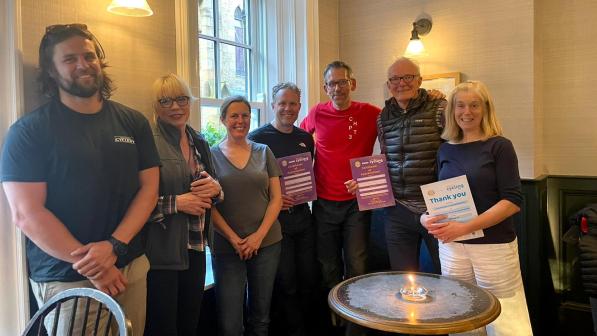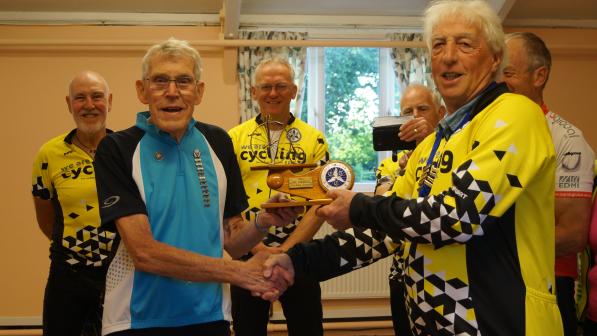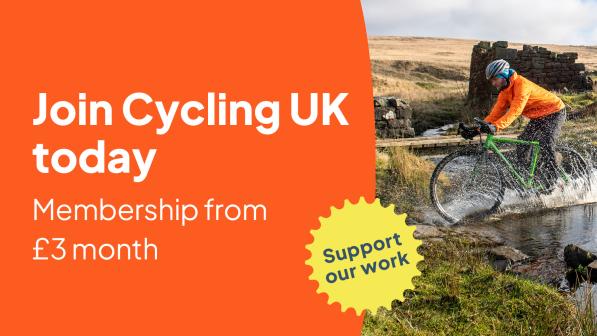Meet Paul Rodman, a member for 50 years

Paul’s journey into cycling
Cycling UK life member Paul Rodman, 64, took to cycling at an early age, exploring his local area firstly on his uncle’s bike then his own Raleigh Chopper.
But like BBC One’s Paddy McGuinness discovered recently, he soon realised that he needed something a bit more lightweight for a more enjoyable touring experience, so he part-exchanged the Chopper for a 5-speed 26-inch wheel 19-inch frame Puch Club Leader racing bike costing £35.
By the age of around 13 or 14, he’d started going on rides on a Sunday morning from his house in Bebington, Wirral, to places outside of his local area such as his Auntie Joyce’s house in Holmes Chapel in Cheshire. Sometimes he would ride considerably further – 100-mile round trips into North Wales and to his grandparents’ house in Prestatyn, for example.
Paul says: “A good friend, Ritchie, who was a teacher in Liverpool, set up a school cycling club, and they gradually started covered longer distances. One such ride was to near Llangollen in Denbighshire more than 50 miles away, arriving back in the early hours of Monday morning!
Think of it, children on small bikes riding all that way, including riding through the Mersey tunnel!”
Eureka!
On a ride with a school friend, he also visited the famous Eureka Café near Chester, which was about seven miles from home. Now sadly closed, it was a Mecca for cyclists, and was frequented by the likes of a young Chris Boardman, who was from a local cycling family.
Paul remembers that Chris’s dad Keith was a time triallist, although there was little sign of his son’s future stellar career in the sport.
Inspired by these encounters in those pre-internet days, Paul decided to enquire about local cycling clubs at the library; he’d encountered the local Merseyside CTC group on the North Wales coast road and realised he could just about keep up with them. He wrote to two clubs, including the Merseyside CTC secretary George Lewis.
Paul says: “I wasn’t very interested in racing; I preferred exploring and touring. George wrote back and said I would be welcome to come on a ride. There were not many riders coming out with the Wirral section so we joined up with Liverpool group and my first outing with them was to Wrenbury in Cheshire, which had an unusual swing bridge.
“Cycling was in decline during the 1970s as more people bought cars and motorcycles. However, the roads were much quieter and traffic slower, with a third fewer vehicles than today. We could cycle on main roads no problem.”
Centenary celebrations
Aged 17, Paul represented the Merseyside District Association (DA) at the centenary celebrations of the Cyclists’ Touring Club (CTC), as Cycling UK was then known, in the south of England, travelling by train and cycling the last few miles.
A member called Bill Oakley, who’d joined the CTC in 1919 and served on the committee, spoke as he had written a book about the organisation called ‘Winged Wheel’ to commemorate its first 100 years.
Sunday rides
Paul says, in addition to the Sunday rides, he enjoyed weekends away youth hostelling with Merseyside DA, as well as national events such as Cycling UK’s Birthday Rides.
Former Cycling UK president and Tour de France commentator Phil Liggett also rode with Merseyside section a few years earlier. Paul met him at a club dinner when Phil was presenting an award.
Although he has seen many changes over the past 50 years, one thing that hasn’t altered is his cyclist’s love of a good café stop. But some aspects of how the refreshments are taken are different.
“There were fewer stops at garden centres in the past. Often the CTC group would roll up at an old lady’s house, which known locally as something like Auntie Mary’s pantry. There wouldn’t be a sign but they did cakes and teas; I didn’t drink tea, but I soon realised I wouldn’t get a drink, so started to drink it!”
In tandem
Paul and his family moved to the Cumbrian market town of Kendal in 1996 and he started riding with the Lancaster District Association, now known as CTC Lancaster and South Lakes, and later with Kendal and District Cycling Scene (KDCS).
Once his son David was old enough, Paul also joined Cycling UK-affiliate group the Tandem Club. He explains: “I was starting to get concerned about the traffic and didn’t want David on his own bike. We still went on rides and even holidays by bike.

“Even though my son is now grown up, I’m still enjoying riding the tandem today with my wife Jeannette, whom I met in 2006. Some people think it’s odd, but we love it, go out at least weekly and still plan our holidays around it.”
Changes
So what has and hasn’t changed about Paul’s passion for cycling over the past five decades? “I still like getting out in the open air and exploring new areas, touring has always been my main focus rather than health and fitness, although that does come even if you only ride a bit.
“You don’t need to be super fit to enjoy the freedom of the outdoors and the positive development of the e-bike means that regular people can benefit from it too, even if their health isn’t brilliant.
“We enjoy getting out in the open air and, even at a slow pace, it’s still nice to explore new routes; exploring is what appealed to me most from the start. However, we now stick to the lanes wherever possible.
“As I said, there’s now three times the volume of traffic since the 1970s. I used to love riding on the main A roads from home to Kidderminster or Cheltenham at 15mph average, because there was the excitement about how far you could go under your own steam.
“We have to accept the roads are far busier nowadays and we now use the back roads but it’s still pleasurable.”
So much did Paul love riding those A roads that he has written a book about it called ‘In search of the A49: from Preston to Ross- on-Wye on a bicycle made for two’.
In it he talks about how he came to know the route through cycling and driving on it and the fascinating attractions on offer along the way, as well as “some of the quieter routes aimed at cyclists along the journey”.
Member benefits
What has being a member of Cycling UK meant to Paul over the last 50 years?
“I became a life member at 35, realising I was seriously interested in cycling. It cost around £350 – the equivalent of about seven years’ annual subs – I think and was a good move as I haven’t had to pay anything since then. It’s not expensive compared to lots of other clubs and represents good value.
“The insurance is a great benefit, and the free legal assistance is useful since roads have got busier. It’s nice to think you’d be defended, as cyclists often seem to get a raw deal and public opinion can be quite anti-cyclist. For example, a local cyclist was recently knocked off by an illegally turning driver and some people blamed the rider!
“Cycle magazine is an interesting read and, of course, membership also includes the opportunity to ride with the local Cycling UK member group and enjoy the support and friendship that comes with that.”
Going the Extra Mile
As well as riding with a local group for the past 50 years, Paul has been a volunteer ride leader for three of those decades so has received a Cycling UK Going the Extra Mile Gold badge for lifetime achievement.
So how does it feel to have been a Cycling UK member now for more than 50 years, having first joined in January 1974?
“I’m amazed at how long it’s been; it really doesn’t seem that long ago that I started cycling but I still really enjoy it. The endorphins have a great effect on depression and your quality of life is just better, even if you can only manage fairly short outings. As someone once said, you can’t be depressed riding downhill on a bike!”


